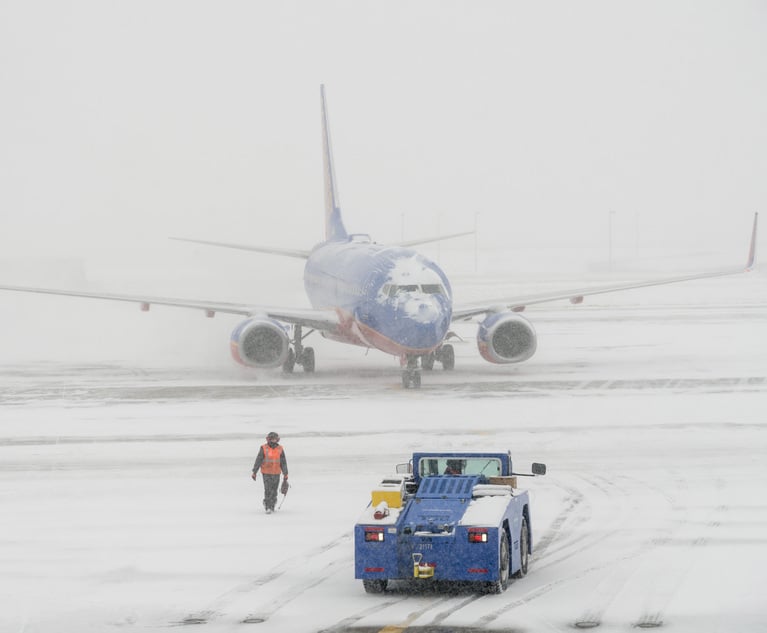In the Opioid Litigation, Who Represents Addicted Babies?
Lawyers attempting to negotiate a global settlement of lawsuits brought over the opioid epidemic aren't representing a key group: babies who have been born addicted to prescription painkillers.
August 24, 2018 at 06:36 PM
5 minute read
The original version of this story was published on National Law Journal
Lawyers attempting to negotiate a global settlement of lawsuits brought over the opioid epidemic aren't representing a key group: babies who have been born addicted to prescription painkillers.
That's according to plaintiffs lawyers who have filed class actions in nine states on behalf of infants, the latest of which was filed Tuesday in New York. A coalition of nine law firms filed court papers asking a federal judge in Ohio for permission to request a separate discovery and litigation track for the baby cases.
One of those lawyers, Scott Bickford, estimated there could be more than 1 million babies diagnosed with “neonatal abstinence syndrome,” which occurs when infants are born to mothers who used opioids. He said the lawsuits seek a trust of more than $1 billion to help pay for medical monitoring of the children over the next few decades.
“There has been no large-scale attempt to find out what happens to these children, and there are thousands at this time, perhaps over 1 million, progressing now through the school system and growing up,” said Bickford, a principal at Martzell, Bickford & Centola in New Orleans. “Theoretically, these kids are born addicted and may stay addicts for life.”
Babies are the latest segment of the opioid epidemic to attempt to get a front-row seat in the legal case against manufacturers and distributors.
More than 1,000 lawsuits have been coordinated in multidistrict litigation in Cleveland before U.S. District Judge Dan Polster of the Northern District of Ohio, who has allowed a limited amount of discovery to go forward.
The vast majority of plaintiffs are cities and counties seeking to recoup the costs of medical treatment and law enforcement. In Florida, the latest proposed class action was filed last week on behalf of state residents against opioid manufacturers. Other lawsuits filed in Florida focus on the addiction costs borne by public agencies.
But Native American tribes, hospitals and others have elbowed into the case. New plaintiffs are emerging, such as class actions — including eight filed last week — filed on behalf of individuals alleging the opioid epidemic caused their health insurance premiums to skyrocket.
At least 11 cases have been brought on behalf of babies, many of whom suffer from addiction and learning disabilities. Bickford said the cases are in states that have medical monitoring laws, which include New York and California. According to the case filed in New York Supreme Court for Niagara County, for instance, lifetime medical costs could include treatment of developmental, psychiatric, emotional or behavioral disorders associated with addiction.
“The intent would be to construct a trust that would deliver financial assistance directly to the custodians of these children,” he said. Custodians could include other family members, foster parents or birth parents who have kicked the habit, he said.
The defendants in all the baby cases include opioid manufacturers Purdue Pharma, Johnson & Johnson, Endo Health Solutions and Teva Pharmaceuticals, as well as distributors McKesson Corp., AmerisourceBergen Corp. and Cardinal Health Inc.
Johnson & Johnson spokeswoman Wanda Moebius wrote in an email: “Our actions in the marketing and promotion of these medicines were appropriate and responsible. The labels for our prescription opioid pain medicines provide information about their risks and benefits, and the allegations made against our company are baseless and unsubstantiated. In fact, our medications have some of the lowest rates of abuse among this class of medications.”
 Photo Credit: UzFoto/Shutterstock.com
Photo Credit: UzFoto/Shutterstock.comEndo spokeswoman Heather Zoumas Lubeski said, “We deny the allegations contained in these lawsuits and intend to vigorously defend the company.”
Representatives of the other defendants either did not respond or declined to comment by deadline.
It's not the first time the coalition of law firms tried to get Polster to create a separate “baby track.” On June 28, the judge denied an earlier request.
“We've asked the court to reconsider our motion for a separate baby track for babies with neonatal abstinence syndrome,” Bickford said. “We don't think the present MDL and the people in it who essentially represent state and local governments really have the children's interests at heart.”
The plaintiffs' executive committee in charge of the opioid MDL has refused to provide information about discovery and depositions, he said. His request described the discovery process as operating under a “cloak of secrecy” and included an attached email exchange in which executive committee member Jayne Conroy of Simmons Hanly Conroy in New York called his request to monitor depositions “not necessary” and “burdensome.”
Conroy said in a statement: “All our legal efforts are directed at the companies who caused the opioid epidemic. Any success will benefit all victims.”
This content has been archived. It is available through our partners, LexisNexis® and Bloomberg Law.
To view this content, please continue to their sites.
Not a Lexis Subscriber?
Subscribe Now
Not a Bloomberg Law Subscriber?
Subscribe Now
NOT FOR REPRINT
© 2025 ALM Global, LLC, All Rights Reserved. Request academic re-use from www.copyright.com. All other uses, submit a request to [email protected]. For more information visit Asset & Logo Licensing.
You Might Like
View All
Miami Judge Approves Shaq's $11 Million Settlement to Resolve Astrals Investor Claims
3 minute read
A Voyeur Videotaped Them Undressing. Should Cruise Ship Passengers Have to Arbitrate?
3 minute read
Data Breach Lawsuit Against Byte Federal Among 1,500 Targeting Companies in 2024
4 minute read
Southwest Airlines Faces $100M Class Action Over Pay Periods
Trending Stories
- 1'A Death Sentence for TikTok'?: Litigators and Experts Weigh Impact of Potential Ban on Creators and Data Privacy
- 2Bribery Case Against Former Lt. Gov. Brian Benjamin Is Dropped
- 3‘Extremely Disturbing’: AI Firms Face Class Action by ‘Taskers’ Exposed to Traumatic Content
- 4State Appeals Court Revives BraunHagey Lawsuit Alleging $4.2M Unlawful Wire to China
- 5Invoking Trump, AG Bonta Reminds Lawyers of Duties to Noncitizens in Plea Dealing
Who Got The Work
J. Brugh Lower of Gibbons has entered an appearance for industrial equipment supplier Devco Corporation in a pending trademark infringement lawsuit. The suit, accusing the defendant of selling knock-off Graco products, was filed Dec. 18 in New Jersey District Court by Rivkin Radler on behalf of Graco Inc. and Graco Minnesota. The case, assigned to U.S. District Judge Zahid N. Quraishi, is 3:24-cv-11294, Graco Inc. et al v. Devco Corporation.
Who Got The Work
Rebecca Maller-Stein and Kent A. Yalowitz of Arnold & Porter Kaye Scholer have entered their appearances for Hanaco Venture Capital and its executives, Lior Prosor and David Frankel, in a pending securities lawsuit. The action, filed on Dec. 24 in New York Southern District Court by Zell, Aron & Co. on behalf of Goldeneye Advisors, accuses the defendants of negligently and fraudulently managing the plaintiff's $1 million investment. The case, assigned to U.S. District Judge Vernon S. Broderick, is 1:24-cv-09918, Goldeneye Advisors, LLC v. Hanaco Venture Capital, Ltd. et al.
Who Got The Work
Attorneys from A&O Shearman has stepped in as defense counsel for Toronto-Dominion Bank and other defendants in a pending securities class action. The suit, filed Dec. 11 in New York Southern District Court by Bleichmar Fonti & Auld, accuses the defendants of concealing the bank's 'pervasive' deficiencies in regards to its compliance with the Bank Secrecy Act and the quality of its anti-money laundering controls. The case, assigned to U.S. District Judge Arun Subramanian, is 1:24-cv-09445, Gonzalez v. The Toronto-Dominion Bank et al.
Who Got The Work
Crown Castle International, a Pennsylvania company providing shared communications infrastructure, has turned to Luke D. Wolf of Gordon Rees Scully Mansukhani to fend off a pending breach-of-contract lawsuit. The court action, filed Nov. 25 in Michigan Eastern District Court by Hooper Hathaway PC on behalf of The Town Residences LLC, accuses Crown Castle of failing to transfer approximately $30,000 in utility payments from T-Mobile in breach of a roof-top lease and assignment agreement. The case, assigned to U.S. District Judge Susan K. Declercq, is 2:24-cv-13131, The Town Residences LLC v. T-Mobile US, Inc. et al.
Who Got The Work
Wilfred P. Coronato and Daniel M. Schwartz of McCarter & English have stepped in as defense counsel to Electrolux Home Products Inc. in a pending product liability lawsuit. The court action, filed Nov. 26 in New York Eastern District Court by Poulos Lopiccolo PC and Nagel Rice LLP on behalf of David Stern, alleges that the defendant's refrigerators’ drawers and shelving repeatedly break and fall apart within months after purchase. The case, assigned to U.S. District Judge Joan M. Azrack, is 2:24-cv-08204, Stern v. Electrolux Home Products, Inc.
Featured Firms
Law Offices of Gary Martin Hays & Associates, P.C.
(470) 294-1674
Law Offices of Mark E. Salomone
(857) 444-6468
Smith & Hassler
(713) 739-1250






